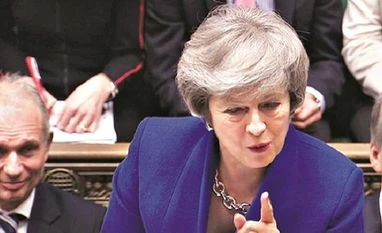At a time of national crisis, it is perhaps unsurprising to hear appeals to the national interest. Theresa May has called on it innumerable times when she has asked MPs to back her Brexit deal. Jeremy Corbyn uses the same concept to implore May to move aside and call a general election.
But times of crisis are in large part about the debasement of political norms and social mores. Old patterns and established behaviours crack. As with practice, so with thinking: concepts become twisted, bent out of shape.
That, though, makes it all the more important to insist on accuracy in the use of key concepts. And perhaps this is no more important than when politicians invoke the concept of national interest. Incredibly hard to define, the notion of one shared position among a nation of 70 million people is contested in itself.
There is one thing we can say for certain about how politicians deploy the term “national interest”: when it is used as an explanation to cover behaviour that is about something else altogether, it is immediately identifiable.
And this is the real danger of this tawdry Brexit denouement. It conforms to a narrative that has been with us with intensity for 20 years – the narrative that no matter what politicians tell us about why they do the things they do, they do not work for the national interest.
Just look at the litany of painful examples in recent years. The gravest example was the US-led invasion of Iraq in 2003. The largest demonstration in British political history showed that the national interest in Britain was not to engage with a disastrous military campaign.
Jump just five short years forward to 2008 and the financial crisis. The banks are bailed out, again, all in the name of the national interest. In the name of social order, it may have been necessary: but as the bankers’ bonuses piled up, the argument that the course of action taken was best for the nation wobbled significantly.
Cue a decade of austerity. At every juncture, we were told that balancing the government books and bringing down the deficit was in the national interest. All the pain that came with austerity – the crumbling social services, the surge of homelessness, the frozen wages – all of it was in the national interest. And yet, when the time is right, the policies of austerity are quickly jettisoned, as chancellor Philip Hammond has shown in his budgets since the election of 2017 (and the loss of the Tory majority).
In between these glaring examples, there has been the constant drip drip of politicians behaving in the name of anything but than the national interest, from the ignominy of the MPs’ expenses scandal, to the various about-turns of Nick Clegg, the politician who told us he was different from the rest, and cared not about politics but about the national interest. We all know how that ended.
Time to speak up
All of this is not only the pre-history of Brexit, of how we got here – how 17 million people were so unhappy with their politicians that they could easily listen to those who preached for a rejection of “the establishment”. It is also the very cause of why we have no politician or party machinery capable of offering a meaningful response based on their conceptions of national interest.
Frankly put, the top level of the political class in the UK has no experience of working in the national interest, and the term has been used so loosely for such a long time that it means nothing in the mouths of our most experienced politicians. May and Corbyn have ploughed their own furrows their entire political lives and seen other leaders claim the national interest with impunity; now it is their turn.
All of this means one thing in terms of where the UK stands now: everyone – every politician of every stripe, and the people in some kind of people’s assembly, as several politicians have suggested – have to sit down together, hit the pause button, and take the time to work out as best we can what the national interest is right now.
Since June 24 2016 the nation has been at loggerheads trying to define what it wants. Politicians on both sides of the political divide, have failed abjectly to help us articulate it – a failure that will dominate their biographies.
But the truth us, we are the national interest – every single one of us. And now is the time for us to take a breath, put the whole
Brexit issue on hold, and work out what a relationship with the EU forged on the real national interest would look like.
Andy Price, Head of Politics, Sheffield Hallam University
This article is republished from The Conversation under a Creative Commons license. Read the original article.
To read the full story, Subscribe Now at just Rs 249 a month
Already a subscriber? Log in
Subscribe To BS Premium
₹249
Renews automatically
₹1699₹1999
Opt for auto renewal and save Rs. 300 Renews automatically
₹1999
What you get on BS Premium?
-
Unlock 30+ premium stories daily hand-picked by our editors, across devices on browser and app.
-
Pick your 5 favourite companies, get a daily email with all news updates on them.
Full access to our intuitive epaper - clip, save, share articles from any device; newspaper archives from 2006.
Preferential invites to Business Standard events.
Curated newsletters on markets, personal finance, policy & politics, start-ups, technology, and more.
Need More Information - write to us at assist@bsmail.in
)